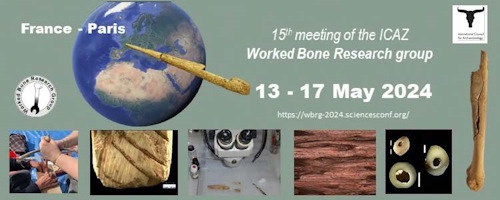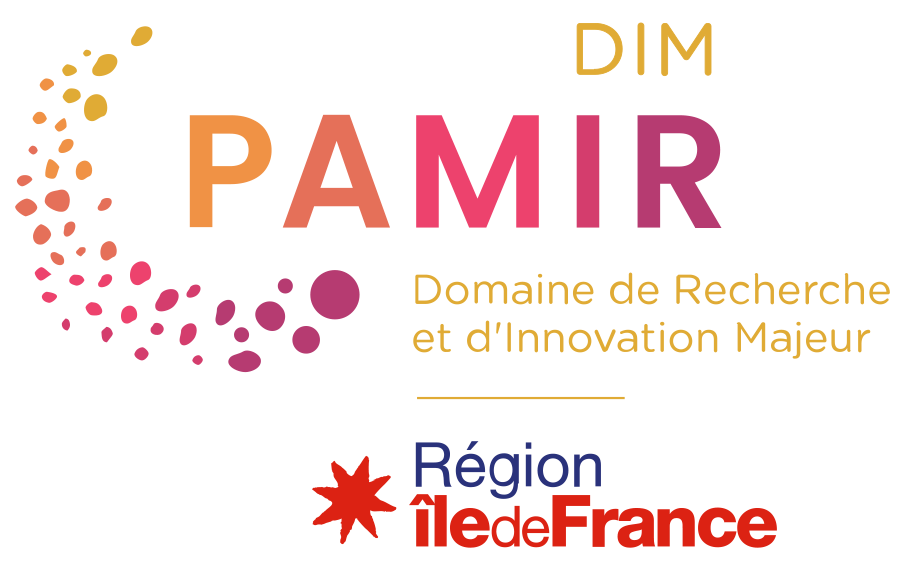
WBRG_2024
15th International Meeting of the Worked Bone Research Group
Scientific responsibility :
- Nejma Goutas
- Marianne Christensen
- Alexandra Legrand
- Jean-Denis Vigne
Methodological axes :
Thematic fields :
Disciplinary sectors :
Partnership :
- Société Préhistorique française
- GDR BioarchéoDat
- SERP – Séminari d’Estudis i Recerques Préhistoriques de l’université de Barcelona
Funding :
- DIM PAMIR
- UMR TEMPS
- EUR Archal de l’université de Paris 1
- GDR BioArchéoDat
- MSH Mondes
- SPF
Project ID : IDF-DIM-PAMIR-2023-2-005
Summary :
The 15th International Meeting of theWorked Bone Research Group will take place in Paris in May 2024. The WBRG is an international working group of the International Council for Archaeozoology (ICAZ). It brings together archaeologists and archaeozoologists involved in the study of worked hard animal materials from the Palaeolithic to the Middle Ages, over a vast geographical area (Africa, Asia, America, Europe, Oceania). In this way, the community contributes to a better understanding of human/animal relationships over time by taking into account economic, social and symbolic aspects, and by extension participates to documenting human/environments relationships. The WBRG structures a community that grows, and works to homogenize “good” scientific practices. Thanks to the diversity and richness of its participants, the WBRG offers a valuable framework for comparing scientific practices from different countries and on records from different chronological periods. The biennial WBRG meetings help to strengthen links between researchers and students by providing a forum for exchange, a crucible for new collaborations and the maintenance of inter-institutional links between countries. The theme of “heritage materials” is at the heart of the 15th WBRG meeting. Fully rooted in the humanities and social sciences, the themes of this event also integrate materials sciences, and are thus able to foster interdisciplinary, trans-chronological and “trans-material” exchanges. The meeting is structured around eight sessions dealing with the experimental approach, interactions between materials, social structures and cultural traditions; technical innovations and stabilities; advances in archaeometry and related ethical issues. This scientific event also aims to build bridges between generations, which is why one session is designed as an open forum dedicated to Masters and Doctoral students.
The round table will be held as part of the SPF Sessions and will be published online in open access.
Scientific organization committee
- Marta Blasco Martín, Assistant-Professeur, Département de Préhistoire, Archéologie et Histoire ancienne, Université de Valence, Espagne (artisanat, matières animales dures, archéométrie, âges des métaux, Mexique préhispanique).
- Jean-François Goret, Archéologue, Département d’Histoire de l’Architecture et d’Archéologie de Paris – Pôle archéologique de la Ville de Paris, France (artisanat, matières animales dures, Moyen Âge, Période moderne).
- Alexandra Legrand-Pineau, Ingénieure de recherche – CNRS, URA 3225 MSH Mondes & UMR 8068 – TEMPS (Industrie osseuse, Tracéologie, Technologie, Néolithique, Monde méditerranéen, Europe).
- Caroline Peschaux, chercheure post-doctorante, UMR 8068 – TEMPS, France (parures, Technologie, Paléolithique supérieur, Mésolithique, Europe).
- Isabelle Rodet-Belarbi, Ingénieure de recherche – INRAP & UMR 7264 – CEPAM, France (Archéozoologie, Industrie osseuse, Périodes romaine, médiévale et moderne, Europe).
- Jose-Miguel Tejero, Ramon y Cajal Program – Chargé de recherche. Département d’Histoire et d’Archéologie. Université de Barcelone, Espagne & UMR 8068 – TEMPS (Industrie osseuse, Technologie, Expérimentation, Paléolithique supérieur, transition Paléolithique moyen / Paléolithique supérieur, Europe, Proche-Orient).

